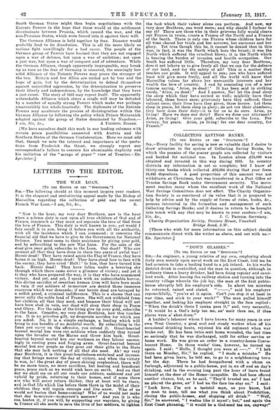LETTERS TO THE EDITOR.
THE WAR LOAN.
ITO THE EDITOR Or THE " BPECTATOR."1 Sia,—The following should at this moment inspire your readers. It is the eloquent and soul-stirring appeal made by the Bishop of Marseilles regarding the collection of gold and the recent
French War Loan.—I am, Sir, &c., Z.
" Now is the hour, my very dear Brethren, now is the hour when a solemn duty is cast upon all true children of God and of France, inasmuch as they must not separate the love of God from the love of France. This duty is well known to you; yet would I fain recall it to you, bring it before you with all the authority, with all the insistence which I can command : it concerns the financial aid that we have to give to the Government for National Defence. You must come to their assistance by giving your gold, and by subscribing to the new War Loan. For the sake of the dead give your gold, subscribe to the Loan. Our dead? Who can recount all that they have done in these two years of awful war! Heroic dead 1 They have raised again the Flag of France, they have borne it on high. Heroic dead! They have stood face to face with the enemy, they have cried 'Halt! ' to him, they have turned him back. Heroic dead! They have fallen under a lowering sky through which there came never a glimmer of victory; and yet it is they who have prepared the way, it is they who have summoned victory. And yet, and yet, I speak with an indescribable horror, this divine sacrifice of countless human lives will have been made in vain if our soldiers of to-morrow are denied those immense resources which war demands; if our heroic dead are betrayed by a selfish greed, a criminal indifference. This is a shame that can never sully the noble land of Prance. She will not withhold from her children all that they need, and because their blood will not have been shed in vain, our dead will sleep their sleep in Peace and Glory. For the sake of the living give up your gold, subscribe to the Loan. Consider, my very dear Brethren, how this touches you. It is no priceless gift, no desperate sacrifice for which you are asked. No, it is a simple exchange, a lending which will bring to you benefits of no doubtful worth. By subscribing to the Loan you carry on the offensive, you extend it. Great-hearted beyond mortal ken were our soldiers when suddenly they turned upon the invader on the Marne and threw him back. Great- hearted beyond mortal ken our workmen as they labour unceas- ingly in casting guns and forging arms. Great-hearted beyond mortal ken our people as they pour out their gifts to the State that she may lack nothing of all that she need. Ah! my very dear Brethren, it is this great-heartedness sustained and increas- ing that brings nearer the day of victory, and when the victory is won, lol the great day of peace shining resplendent, there will be no more tears, no more sacrifices, but healing and beneficent peace, peace such as we would wish here on earth. And on that day we shall see on all our roads our soldiers, saddened and yet upheld by pride, returning to their homes, and if some there are who will never return thither, they at least will be there, and in that life which lies before them there in the midst of their children they will regain courage and live anew. Who of us would not hasten that home-coming? Who of us would not make that day to-morrow—to-morrow's morrow? And you it is who can hasten it, if you will, by supporting our warriors, by giving to France all she needs to save the lives of her soldiers, to lighten the task which their valour alone can perform. And now, my very dear Brethren, one word more; and why should I forbear to say it? There are those who in their grievous folly would cleave our France in twain, create a France of the North and a France of the South. There is only one France whose children have for all time shared her trials and her sorrows, her successes and her glory. Yet true though this be, it cannot be denied that in this war, in fact, it was the North which bore the brunt; it was the North which suffered the cruellest blows; it is the North which is bearing the burden of invasion and hostile occupation. Our South has suffered little. Therefore, my very dear Brethren, does it not behove ns to give freely all that we can for the defence of our land, and for the safety of all? This is a matter that touches our pride. It will appeal to you; you who have suffered least will give more freely, and all the world will know that Marseilles values far above her mercantile interests and her wealth the love of country. I end by reminding you of a now famous saying, ' Arise, ye dead! ' It has been said in striking words, 'Arise, ye dead! ' And I answer, No I let the dead sleep the sleep which they have earned so well; mightily have they laboured, these brave ones; grievously have they suffered, these valiant ones; their lives have they given, these heroes. Let them sleep in peace, let them sleep in glory; do not vex their slumbers; they have done their duty—it is for us to do ours. Arise, ye living! Have we done our duty? Have we done our uttermost? Arise, ye living! Give your gold, subscribe to the Loan. For victory, for peace. Arise, ye living! for our dear country, for France."


























 Previous page
Previous page